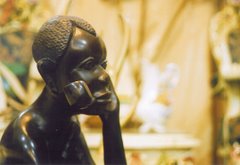Bragging Rights!!! My Interview was in the papers! : )
INVESTMENT in today’s context is really a big word as we increasingly become globalised in our financial activities. Given the liberalisation coupled with technology advancement, retail investors can easily invest offshore without having to leave home. An increasing number of stockbrokers offer foreign share trading accounts to clients. They include HLG Securities Sdn Bhd, OSK Investment Bank, HwangDBS Investment Bank and CIMB-GK Securities. Securities houses such as CIMB-GK provide trading in the US market. A local dealer says the abundant liquidity, overseas government support and liberalisation from the local government have fuelled retail investors’ overseas buying spree. However, he says offshore investment decisions should be given due consideration and be well thought out before they are executed. “Every foreign country has its risk profile in terms of investment opportunities based on their respective domestic financial markets and monetary policies,” he says. Although his brokerage has yet to offer overseas trading, he advised clients who wanted to trade overseas to open an account with the brokerage in Singapore. According to the dealer, opening an offshore investment account was “fairly easy”. He says the charges in Singapore were cheaper. Although some offshore trading transactions were still executed via dealers, with the Internet, access to information is much more efficient. Investors can easily key in the counters or securities code to view the share movements as most brokers’ websites provide live update. Share price movements are provided live on brokers’ websites. Decision-making by investors is faster and easier and they can source information from the websites of each individual stock exchange and companies. Chan Seng Wah, 63, a retiree says he has been investing overseas for some time now and mostly in Hong Kong and Singapore. He says his investments are long term and mostly in blue-chip counters. “I managed to buy some blue chip stocks in Hong Kong after the prices have been beaten down recently,” Chan says, adding that he is happy with his investments and prices have appreciated substantially. Chan says overseas investment for him represents added opportunity and is a way to diversify. “For example, the US and other foreign shares do not always move in tandem. When one is up, the other may be down, and vice versa,” he adds. However, he says he had also made wrong market predictions and bought warrants, recording some losses. He recalls his shock when the Hang Seng Index plunge from 28,000 to 20,000 last October. “Since the credit crunch I have become more cautious,” he adds. For investors with the patience to do their research, international stocks can offer big rewards. Benjamin Samin, 28, a project manager, started trading forex because the start-up capital was low. He spent a lot of time googling and a lot of time sitting on the floor of Kinokuniya and MPH to learn about the market. “We can start with a small capital of US$1,000 and easily make returns. The forex market trades at a volume of four to seven trillion a day, so no single news or big investor can affect the market like it does in stocks,” he says. Moreover, the market is open 24 hours, six days a week, he says, adding that it is good for people with a full time job as they can trade at night. “The brokers usually give a margin to traders, at an average of 100:1, for example, for every US$1,000 you trade, you actually control a US$100,000 unit and the profits you get are from the investment of US$100,000,” he says, adding that in forex, the price fluctuations are relative to the economy of a particular country. So it trains you to have a larger view of the global markets, and to think like an economist. “Although many people have lost much money, sometimes entire savings, in the forex market, it is vital to set stop losses intelligently on every trade to manage losses. “Everyone will make losses, but it is when they don’t cut the losses that’s when they make the biggest mistakes and end up shutting down entire portfolios. If you can manage this, the volatility of the forex market gives a good 20% to 40% return on very short-term trade,” Samin says. He started to make profit within four months. “I lost a good sum to start with, but I consider that my education.” Lim Mee Ying, a housewife, says it is difficult for her to invest offshore and do all the necessary research so she parks her savings with managed funds. She started with RM1,000 and has been getting steady returns higher than the fixed deposit rate, which is not a major feat considering how low the rates have dropped. “Managed funds will presumably get you the same level of returns with less time and a lot less angst,” she says, adding that she looks forward to the statement from her management company as she usually gets good news. Admittedly, a large number of investors are excited about being able to put their funds in foreign financial markets that suit their investment and risk profile. To them, the diversity and freedom to explore products from different markets add some spice to their life. However, there are also conservative investors who are not so upbeat about investing abroad because they feel that offshore retail investment is too risky and not worth the time and effort. _____________________________________________ Heres the link to the article guys. Print it, frame it and hang it on the wall okay.. i'll autograph it later. haha: ) and a happy ramadhan to my Muslim Friends http://biz.thestar.com.my/news/story.asp?file=/2009/8/15/business/4515533&sec=businessSaturday August 15, 2009
Cashing in on offshore investment
By LEONG HUNG YEE






1 comment:
Offshore investment is quite demand-able now a days, for the reason that their assest are protected from creditors and other legal issues in the future.
Jessica
Post a Comment